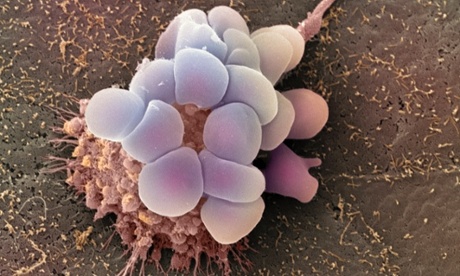British scientists have developed and clinically tested a drug that could prolong the lives of thousands of women suffering from one of the most aggressive cancers.
Ovarian cancer kills 4,500 women a year and has proved particularly difficult to treat. It is more than a decade since medics have had a new weapon at their disposal with which to tackle the disease, but if further trials confirm the effectiveness of the new drug, it could be available within five years, say researchers.
A clinical trial of the drug, codenamed CNTO328, has been carried out at Centre for Experimental Cancer Medicine, part of Barts and the London School of Medicine and Dentistry.
Eight of the 18 women involved found their tumours stabilised or shrank while they were taking part, which should mean they live longer than doctors originally expected. It is an unusually high proportion for an experimental cancer drug study. Typically only between five and 20% of participants secure any benefit from taking untried treatments.
Each year 6,800 women are diagnosed with cancer of the ovaries. About half die within three years, partly because so few drugs exist to stop it spreading in the body - no new treatment has been introduced for more than a decade. It is the fifth most common cancer among women and the fourth biggest killer after lung, breast and bowel cancer.
Professor Iain McNeish, a professor of gynaecological oncology at Barts and chief investigator of the trial, said: "We have taken the drug from the laboratory into patients and the results are promising.
"The hope with this group of patients was to slow down the progress of their ovarian cancer, improve the quality of their life and possibly make them live longer. We have been quite successful in doing that. If this becomes a treatment, this is a whole new approach to treating ovarian cancer," he added.
The drug is an antibody which works by targeting a molecule called Interleukin 6, which is made by cancer cells and is vital to help them multiply, spread and develop their own blood supply.
Interleukin 6 is found in many cancers but plays a key role in ovarian cancer's movement into the abdomen. The antibody binds to the Interleukin 6, blocks its progress by ensuring that it cannot bind itself to the cancer cells to assist their growth and thus renders it harmless.
McNeish hopes that, if further trials confirm the drug's potential, it could prove as effective in tackling ovarian cancer as Herceptin has been in breast cancer. CNTO328 works in a similar way to Herceptin, which has revolutionised breast cancer treatment in recent years.
"The dream scenario is that a combination of the existing chemotherapy drugs and this type of antibody will be a big breakthrough and open up a new avenue for the treatment of ovarian cancer", said McNeish.
The new drug is the result of a collaboration between Professor Fran Balkwill, an expert in cancer and inflammation at the Institute of Cancer at the same medical school as McNeish, and a Dutch biotech company called Centocor, which is now owned by Johnson & Johnson.
Eighteen women with the disease from north-east London and Essex joined the trial which began in late 2007.
All 18 were expected to live for less than a year when they began receiving the drug because their cancer had returned after undergoing several courses of chemotherapy.
Ten died but the health of eight did improve. Seven of those eight are still alive.
"At the end of the trial, eight of the women were either stable or getting better. Their cancer had stopped growing. That doesn't sound great, but in ovarian cancer that's pretty good because [without the drug] the disease would have progressed in all of them," said McNeish.
In addition, the drug did not produce the side effects involved in chemotherapy, such as hair loss, vomiting and constant fatigue. While treatment of and survival rates for other forms of cancer have improved, mainly due to the emergence of new drugs, the prospects for those with ovarian cancer have remained poor.
The low number of women still alive five years after diagnosis - 30% - has not changed in 30 years. In contrast, over the same period survival amongst breast cancer sufferers has increased from 50% to 80%.
Annwen Jones, chief executive of the charity Target Ovarian Cancer, said there were too few drugs available to treat the condition because of a lack of research. "This early stage trial certainly shows promise, because it appears that the growth of tumours has been slowed down in a good proportion of the patients who took part in the study.
"Women being treated for ovarian cancer could be forgiven for despair, particularly when they grow resistant to chemotherapy and there are no drugs that can get them over this hurdle. Research projects like this are vital if we are to develop desperately needed new treatments," she said.





